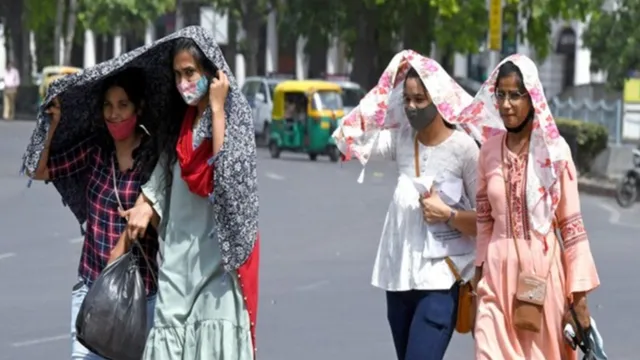- By Raju Kumar
- Tue, 18 Mar 2025 12:20 PM (IST)
- Source:JND
The India Meteorological Department (IMD) issued a heatwave alert for several states for upcoming days. The heatwave alert comes days after a few spells of rains and strong winds, bringing temporary relief to Northern parts of India. Now, the IMD said that the region may see a temperature rise and the first spell of heatwave of the season.
Heatwave Warning from 17th to 19th March, 2025#IMD #WeatherUpdate #weatherforecast #mausam #heatwave #heat@moesgoi @ndmaindia @DDNational @airnewsalerts pic.twitter.com/BysoBIQBFC
— India Meteorological Department (@Indiametdept) March 17, 2025
According to the weather department, people in Delhi-NCR, who are enjoying enjoying a pleasant 31 degrees Celsius, may see the mercury up to 40 degrees Celsius by March end.
Meanwhile, Delhi's maximum temperature on Monday stood at 29.2 degrees Celsius, 2.1 notches below the seasonal average. The minimum temperature was recorded at 16.8 degrees Celsius, with humidity levels ranging between 74 per cent and 44 per cent. The IMD has forecast strong winds for Tuesday, which could help disperse pollutants. The maximum and minimum temperatures are expected to be around 32 degrees Celsius and 17 degrees Celsius, respectively.
Delhi's air quality dips to 'moderate'
Delhi's air quality dips to 'moderate' after two days of 'satisfactory' levels
New Delhi, Mar 17 (PTI) The air quality in the national capital slipped to the 'moderate' category on Monday with an Air Quality Index (AQI) of 108, after two days of 'satisfactory' air.
According to the Central Pollution Control Board (CPCB), Delhi recorded an AQI of 99 on Sunday, marking the second consecutive day of 'satisfactory' air quality.
On Saturday, the city experienced its cleanest air between January 1 and March 15 in the last three years, with an AQI of 85, marking the first 'satisfactory' air quality day of 2025.
The AQI scale categorises air quality as follows: 0-50 'good,' 51-100 'satisfactory,' 101-200 'moderate,' 201-300 'poor,' 301-400 'very poor,' and 401-500 'severe.'
(With agency inputs)

